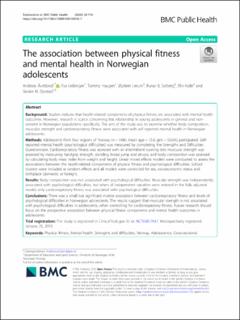The association between physical fitness and mental health in Norwegian adolescents
Åvitsland, Andreas; Leibinger, Eva; Haugen, Tommy; Kolle, Elin; Lerum, Øystein; Solberg, Runar Barstad; Dyrstad, Sindre Mikal
Peer reviewed, Journal article
Published version
Permanent lenke
https://hdl.handle.net/11250/2724871Utgivelsesdato
2020Metadata
Vis full innførselSamlinger
- Artikler / Articles [2119]
- Publikasjoner fra Cristin [1107]
Sammendrag
Background: Studies indicate that health-related components of physical fitness are associated with mental health outcomes. However, research is scarce concerning this relationship in young adolescents in general and non-existent in Norwegian populations specifically. The aim of the study was to examine whether body composition, muscular strength and cardiorespiratory fitness were associated with self-reported mental health in Norwegian adolescents.
Methods: Adolescents from four regions of Norway (n = 1486; mean age = 13.9; girls = 50.6%) participated. Self-reported mental health (psychological difficulties) was measured by completing the Strengths and Difficulties Questionnaire. Cardiorespiratory fitness was assessed with an intermittent running test; muscular strength was assessed by measuring handgrip strength, standing broad jump and sit-ups; and body composition was assessed by calculating body mass index from weight and height. Linear mixed effects models were conducted to assess the associations between the health-related components of physical fitness and psychological difficulties. School clusters were included as random effects and all models were controlled for sex, socioeconomic status and birthplace (domestic or foreign).
Results: Body composition was not associated with psychological difficulties. Muscular strength was independently associated with psychological difficulties, but when all independent variables were entered in the fully adjusted model, only cardiorespiratory fitness was associated with psychological difficulties.
Conclusions: There was a small but significant inverse association between cardiorespiratory fitness and levels of psychological difficulties in Norwegian adolescents. The results suggest that muscular strength is not associated with psychological difficulties in adolescents, when controlling for cardiorespiratory fitness. Future research should focus on the prospective association between physical fitness components and mental health outcomes in adolescents.
Beskrivelse
This article is licensed under a Creative Commons Attribution 4.0 International License, which permits use, sharing, adaptation, distribution and reproduction in any medium or format, as long as you give appropriate credit to the original author(s) and the source, provide a link to the Creative Commons licence, and indicate if changes were made. The images or other third party material in this article are included in the article's Creative Commons licence, unless indicated otherwise in a credit line to the material. If material is not included in the article's Creative Commons licence and your intended use is not permitted by statutory regulation or exceeds the permitted use, you will need to obtain permission directly from the copyright holder. To view a copy of this licence, visit http://creativecommons.org/licenses/by/4.0/. The Creative Commons Public Domain Dedication waiver (http://creativecommons.org/publicdomain/zero/1.0/) applies to the data made available in this article, unless otherwise stated in a credit line to the data.
